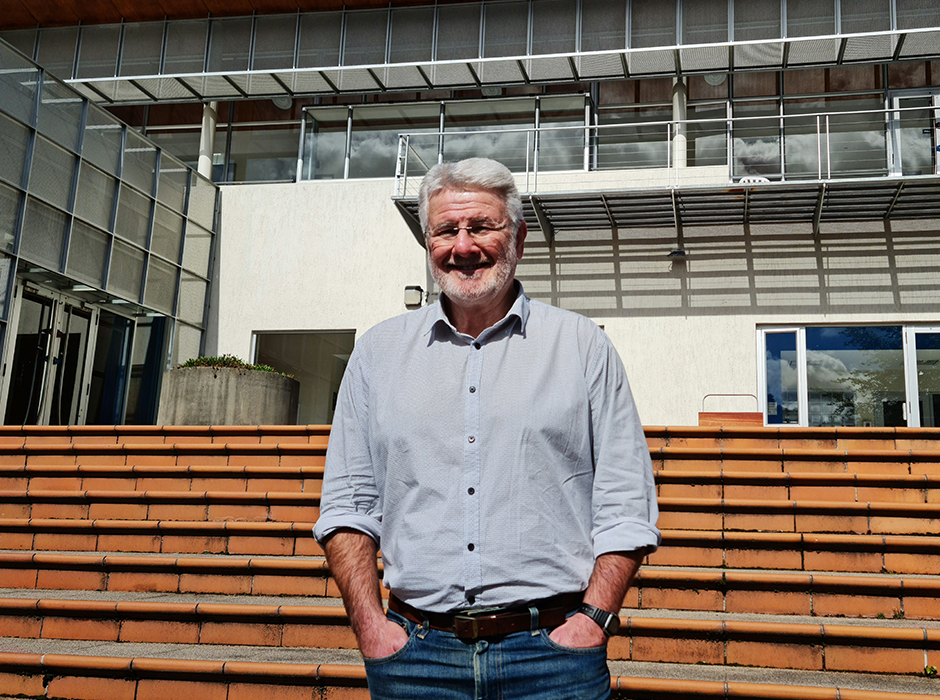
After nine years in the role of Provost, Dr Ken Hodge says the time is right to step down and let someone else take the wheel.
“To know I may have played a role, along with a lot of other people, in helping a young person not go down a path that’s going to lead them to no degree, a lot of student debt and worse – some of them could end up in front of the courts – those successes are pretty big.” – Dr Ken Hodge
After serving three terms as Provost, Professor Ken Hodge is stepping down from the role to focus on his work at the School of Physical Education, Sport & Exercise Sciences. Here he talks with Laura Hewson about the challenges and rewards of his time as Provost, and answers the burning question … what exactly is a Provost?
During his nine years as Provost, Professor Ken Hodge has been asked one question more than any other. What exactly is a Provost?
“I think most students – and even many staff – don’t know,” says Ken, who is a Professor in sport and exercise psychology at the School of Physical Education, Sport & Exercise Sciences.
“I know I didn’t. When I was asked to take on the role in 2015, I had to ask, ‘Can you fill me in?’ Then I was like, ‘Who dobbed me in for this?’”
Ken has since served three terms of three years as Provost. He will step down from the role at the end of the month to focus more on departmental duties.
“Last year I accepted a position of Associate Dean and am chairing our research committee, which is a fairly big role. I can’t do that and be Provost and do my teaching and keep publishing, so something had to give.”
The main responsibility of the Provost is deciding on appropriate disciplinary action for those who’ve breached the Code of Student Conduct, a responsibility that Ken has taken very seriously. There is no one-size-fits-all approach, he says.
“One of the factors the Provost takes into account is whether they’re a frequent flier – a repeat offender – but we also consider what programme they’re studying, what kind of progress they’re making and other mitigating circumstances. For example, some of them are in difficult financial situations and they’re working part-time jobs.
“If I don’t have all that information available to me then I could just hand out a punishment or disciplinary action that doesn’t fairly reflect the student’s overall circumstances. So, you make sure you take all that into account before you arrive at a conclusion. A breach may be very similar to a student you’ve just seen, but their personal circumstances won’t be identical.”
Ken emphasises that most students are “having a fine old time” and aren’t a danger to themselves or others, but a very small minority – less than 2 per cent – step over the line.
The rise in flat initiations hasn’t helped, he says.
“Within the last 10 years, Castle and Cumberland Streets have grown as party streets. Some named flats seem to have a bit of a reputation and can attract students to whom the idea of being initiated, and then initiating those who follow them, appeals.
“The problem is, it’s become a bit of an arms race where successive groups feel the need to do what was done to them, but add something. The end result is events that are not only demeaning but also dangerous to physical and mental health. Some ‘hosts’ fail to take into account the very serious risks involved and the reality that consent given by a ‘guest’ can’t be relied as either freely given or as covering activities that can spiral beyond what they ever expected.”
Last year the Vice Chancellor excluded students due to flat initiations, which Ken hopes sends the message to the student body – and beyond – that the University is taking these matters seriously.
“I take no joy at all from a student getting excluded, but I do take some satisfaction in the sense that by doing so we’re keeping other students on campus safe.

Outgoing Provost Ken Hodge shares a "twinning" moment with former Provost Professor Bob Knight back in 2015 when Ken first took over the role. Photo: Emma Allen
“As the Proctor often says, we’re not the fun police. We want students to have fun, but we want it to be safe fun. And that’s essentially why I agreed to be Provost all those years ago and why I’ve accepted renewal twice. It’s because I think the role is an important one and I think that by enforcing those disciplinary statutes and meting out appropriate disciplinary actions, that hopefully we’re changing unsafe student behaviours.”
Alcohol is most often an aggravating factor, radically changing some students’ behaviour and personalities, he says.
“Some of the pastoral care successes we’ve had over the years have been helping students get alcohol counselling. I’m pretty sure one young man I recommended get counselling only went because he thought it would play in his favour. After two sessions he sort of opened up to the counsellor and started really making some big progress. It doesn’t always happen obviously, but these are highlights for me.
“To know I may have played a role, along with a lot of other people, in helping a young person not go down a path that’s going to lead them to no degree, a lot of student debt and worse – some of them could end up in front of the courts – those successes are pretty big.”
These successes, as well as his teaching and playing “very bad” golf, have helped balance the challenges of being Provost but the role would probably benefit from having another set of hands on the steering wheel, he says.
“I don’t think it’s happened to me, but there is the potential for people to become burned out and jaded in this role because you’re often dealing with quite negative behaviours that are distressing to consider.
“But this is a service that the University needs to provide as a moral and pastoral duty. We have a role in looking after every parent’s son and daughter who comes here and it’s a real honour to be asked to fill the position and then continue for another two terms. It’s a nice acknowledgement you must have done something right.“
PROV101 with Professor Ken Hodge
What is a Provost?
The University of Otago’s Provost is a member of the academic staff whose principal responsibilities are to hold disciplinary hearings and impose penalties in cases of serious misconduct by students.
“The Provost is always an academic staff member because while, yes, the major part of the role is sorting out an appropriate, proportionate disciplinary action for students who have breached the Code of Student Conduct, there’s also a strong aspect that’s pastoral care, because their academic studies and progress is of primary importance to them and to us.
How is the Provost different from the Proctor?
“The Proctor is a full-time position and deals with well over 90% of all the breaches of the Code of Student conduct. He also runs Campus Watch.
“The serious breaches of the Code – flat initiations, burning couches, breaking glass, assault, anything that’s illegal that might end up in front of the courts – that inevitably gets referred by the Proctor to the Provost. And the reason for that is the Provost has stronger powers of disciplinary action than the Proctor.”
What powers does the Provost have?
The Provost has powers to fine, set up to 60 hours of community service and can make a recommendation to the VC that a student be excluded. The powers of the Provost are set out in the Student Conduct Statute 2021.
“I seldom hand out fines because I don’t think they’re necessarily a good deterrent. The number of students who complain about the community service hours tells me that it is a genuine punishment that will hopefully change behaviour and that in the future they won’t do the same silly stuff again,” he says.